Overview
The article outlines a structured 6-week diet plan designed to help individuals lose 20 pounds by following three key phases: detoxification, calorie reduction, and maintenance of healthy habits. It emphasizes the importance of whole foods, portion control, hydration, and exercise, supported by expert insights and research, to ensure sustainable weight loss and long-term health benefits.
Introduction
In a world where weight loss solutions are often overwhelming and contradictory, the 6-week diet framework emerges as a beacon of clarity and structure. This comprehensive program is designed to guide individuals through a transformative journey, divided into three distinct phases that promote detoxification, calorie management, and sustainable habits.
By integrating practical dietary strategies and exercise regimens, participants can effectively navigate common weight loss challenges while fostering long-term success. With expert coaching and personalized support, this framework not only enhances physical health but also empowers individuals to cultivate a balanced lifestyle that endures beyond the initial weight loss goal.
Understanding the 6-Week Diet Framework
The 6 week diet plan to lose 20 pounds offers a strategic and actionable nutritional framework for effective fat reduction, organized into three distinct phases. The initial phase is dedicated to detoxifying the body, allowing individuals to eliminate toxins and reset their metabolism. During this stage, participants are encouraged to adopt a no-sugar diet, as highlighted by Katherine Marengo, LDN, R.D., who states, 'Adopting a no-sugar diet can benefit several aspects of a person’s health.'
The second phase shifts focus to calorie reduction, ensuring that nutritional balance is maintained through the incorporation of a variety of safe, nutrient-dense foods without added salt or sugars. This aligns with recommendations from the 13th General Program of Work (GPW13), emphasizing the importance of reducing salt intake as a priority action. Additionally, understanding caloric needs is crucial during this phase, which can be calculated using the Mifflin-St Jeor equation:
10 x mass in kg + 6.25 x height in cm – 5 x age in years – 161
The final phase emphasizes maintaining a healthy body composition through sustainable habits, which includes continued meal planning and the tracking of progress to promote accountability. Foresight Health Coaching provides tailored coaching services that support individuals through each phase of this framework, offering personalized nutritional guidance and wellness workshops to reinforce sustainable practices. Moreover, Foresight’s corporate memberships include comprehensive pantry and nutrition services, in-person wellness talks, and access to the health and wellness app, enhancing the support available to clients.
By understanding and following this comprehensive framework, individuals can stay motivated and dedicated throughout their journey to better health, significantly improving their chances of success with the assistance of Foresight's expert coaching, particularly when implementing a 6 week diet plan to lose 20 pounds.
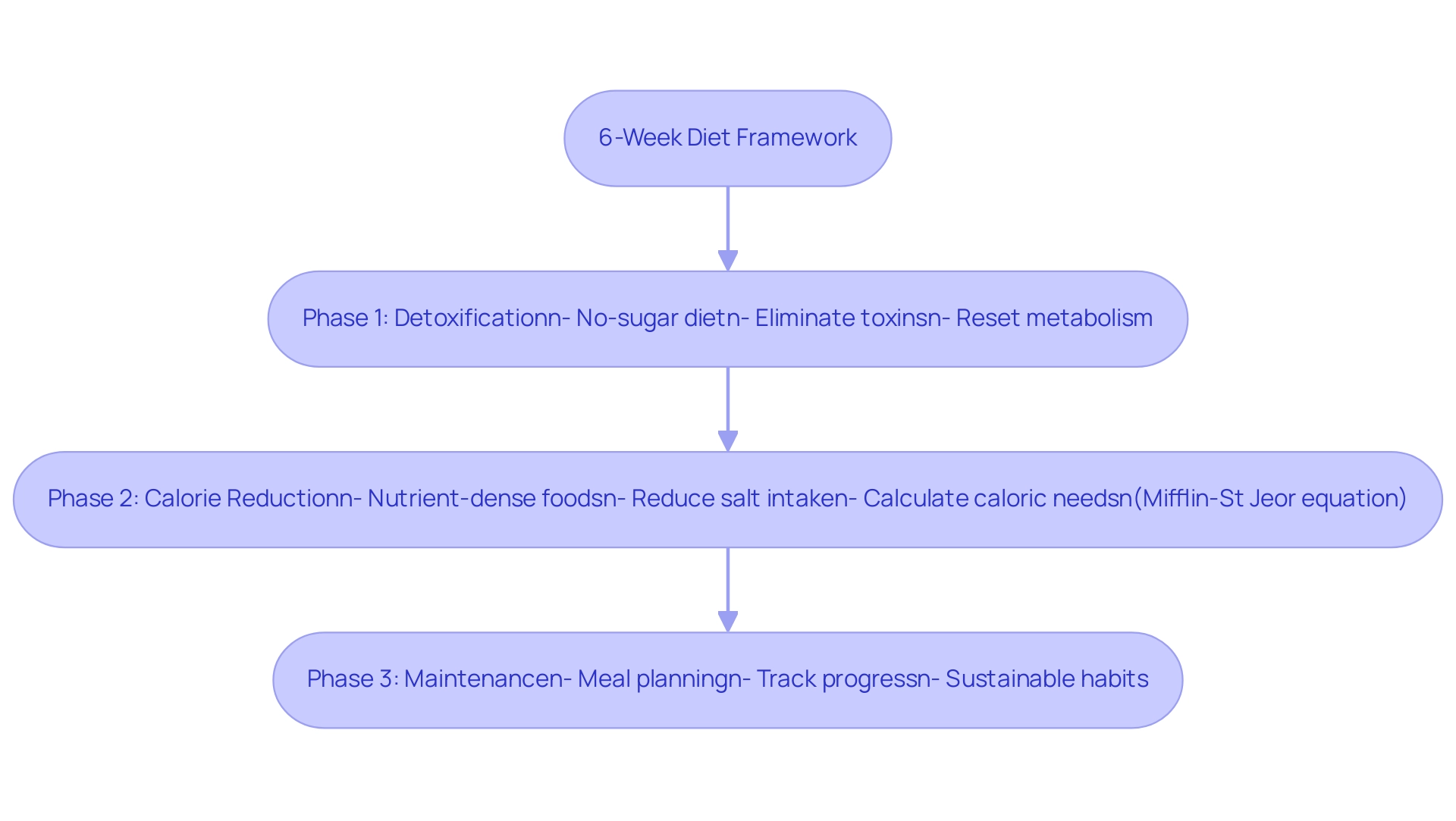
Key Dietary Strategies for Effective Weight Loss
To attain successful reduction in body mass, following a 6 week diet plan to lose 20 pounds is crucial. Here are several key approaches:
-
Prioritize Whole Foods: Emphasize the consumption of whole foods such as fruits, vegetables, lean proteins, and whole grains while minimizing processed items.
Marine Melamed, a registered dietitian, aptly notes,
It is as simple as choosing foods that are not packaged, throwing them into a frying pan, and voila! You just made yourself a natural, whole-food meal!
This simplicity highlights the importance of whole foods in a reduction plan.Research on the Whole Food Plant-Based (WFPB) diet indicates that participants experienced twelve-month mean reductions of 4.2 kg/m in BMI points and 0.55 mmol/l in total cholesterol, highlighting its effectiveness.
-
Control Portion Sizes: Utilize smaller plates and bowls to help manage portion sizes, thereby reducing overall calorie intake.
Studies show that proper portion management is essential for maintaining a healthy body composition and can result in considerable decreases in body mass index (BMI).
-
Stay Hydrated: Consuming ample water throughout the day can assist in controlling hunger and enhancing metabolic processes.
Staying hydrated is a foundational aspect of a 6 week diet plan to lose 20 pounds.
-
Plan Meals Ahead: Strategically preparing meals in advance can prevent unhealthy, impulsive eating decisions.
This proactive approach is crucial for maintaining a balanced eating plan.
-
Incorporate Healthy Fats: Including sources of healthy fats, such as avocados and nuts, can help enhance satiety without contributing to excessive calorie intake.
Evidence suggests that a balanced nutrition plan featuring complex carbohydrates, healthy fats, and protein not only sustains energy levels but also contributes to overall well-being and productivity. For example, a case study titled "Increasing Energy Levels with Balanced Nutrition" shows that a balanced diet ensures a diverse nutrient profile that sustains energy throughout the day, enhancing overall well-being and productivity. Furthermore, future research could focus on identifying participants likely to succeed with dietary changes to reduce dropout rates and enhance effectiveness.
By employing these strategies, individuals can make informed food selections that align with their goals for a 6 week diet plan to lose 20 pounds, resulting in successful outcomes.
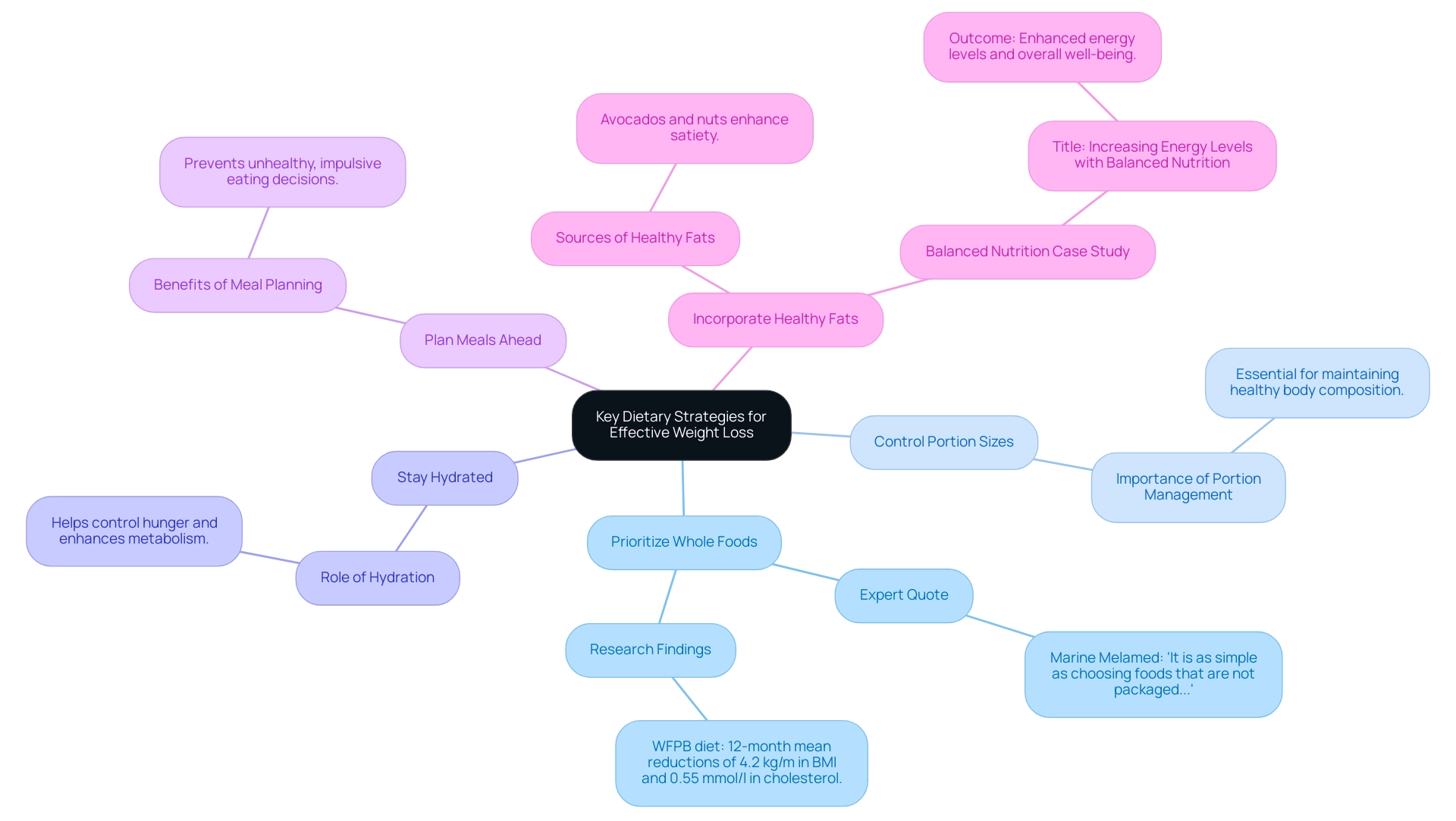
Incorporating Exercise into Your Weight Loss Journey
Incorporating physical activity into your weight loss journey is crucial for optimizing results and enhancing overall health. Current recommendations suggest aiming for at least 150 minutes of moderate aerobic activity each week, such as brisk walking or cycling, alongside exercising five days a week at energy expenditure levels of 400 to 600 kcal/session. Additionally, incorporating strength training routines at least twice a week is vital for building muscle mass, which can significantly boost your metabolism.
To ensure success, consider these effective strategies, supported by personalized coaching:
- Identify Enjoyable Activities: Engaging in activities you love can enhance consistency and make physical activity a rewarding part of your routine, with experienced coaches guiding you to find what suits you best. For instance, one client shared, 'I never enjoyed running until my coach helped me discover a love for cycling, which has made all the difference.'
- Establish Realistic Goals: Begin with attainable objectives, such as committing to physical activity three times a week, and gradually escalate both the frequency and intensity of your workouts, ensuring that your goals are tailored to your unique circumstances. A coach might help you set a goal of walking 10,000 steps daily, breaking it down into manageable increments.
- Incorporate Movement into Daily Life: Small changes, like taking the stairs or walking during breaks, can substantially increase your daily activity levels. A randomized controlled trial by Jakicic et al. suggested that although the variation in reduction of mass was not statistically significant, participants who took part in more intense physical activity reported a decrease of 1.7 kg over 12 months. This underscores the notion expressed by Blundell et al., who noted that, 'There appeared to be a large difference in individual responses to physical activity.'
By aligning physical activity with your nutrition strategy and utilizing personalized coaching, you can not only boost your weight reduction efforts but also enhance your overall well-being, as exercise offers numerous health advantages beyond weight reduction.
Ready to take the next step? Contact us today to schedule a consultation and start your journey towards a healthier you!
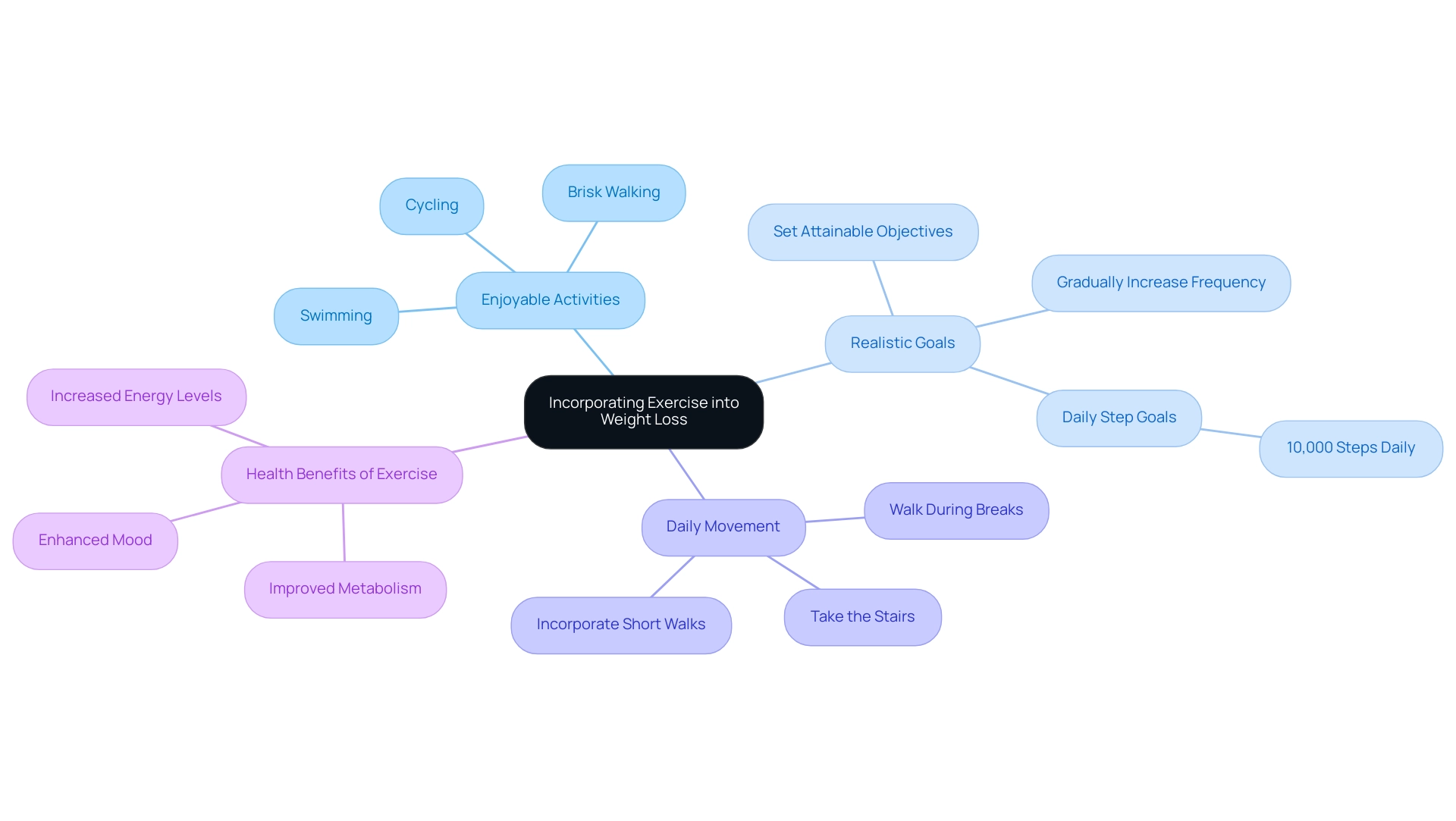
Overcoming Common Weight Loss Challenges
Embarking on a 6 week diet plan to lose 20 pounds often brings a set of challenges that can impede progress. Here are effective strategies to navigate these hurdles:
-
Plateaus: Weight reduction may stall due to various factors.
When this happens, it's essential to reassess your total calorie intake and activity levels. Research indicates that individuals can benefit from incorporating new exercises, such as sprint interval training, which has been shown to result in 39.95% more body fat reduction in 60.84% less time than traditional HIIT. Additionally, adjusting portion sizes can reignite progress.
It's important to note that a 6% decrease in mass over eight years, as seen in the Look Ahead trial, can yield significant improvements in cardiovascular risk factors, underscoring the long-term benefits of consistent efforts.
-
Cravings: Understanding cravings is crucial.
Identifying triggers can help in finding healthier alternatives. For instance, when the urge for sweets arises, consider satisfying it with fruit or a small piece of dark chocolate, which can provide a healthier option without disrupting your eating plan. It’s also worth noting that it is certainly possible that the patients who successfully shed pounds on one diet would have been equally successful had they been assigned to an alternative diet, highlighting the importance of personalized dietary choices.
-
Social Situations: Anticipating social events can prevent dietary slip-ups.
Strategically consuming a nutritious snack prior to attending gatherings or choosing healthier options at restaurants can assist in sustaining your fitness goals.
-
Motivation: Keeping your goals visible and celebrating small achievements can significantly enhance motivation.
Recognizing the efforts you put in, no matter how minor, will help maintain focus during challenging times.
For individuals having difficulty sustaining reductions in body mass after lifestyle changes, interventions such as pharmacotherapy with GLP-1 receptor agonists or bariatric surgery may be helpful, especially when paired with behavioral strategies. By preparing for these typical challenges and employing effective strategies, you can remain dedicated to your fitness journey and achieve swift results by following a 6 week diet plan to lose 20 pounds.
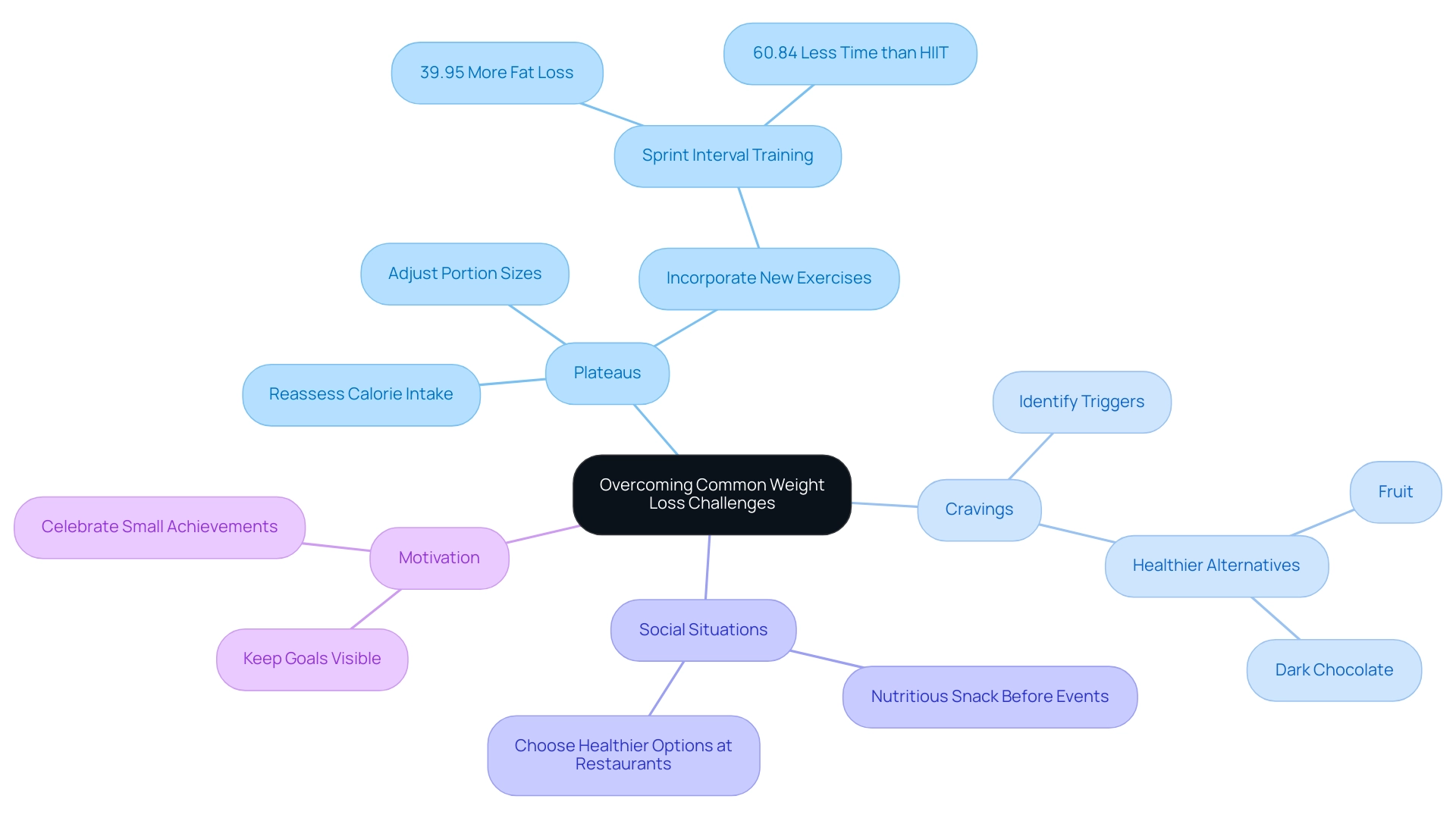
Sustaining Weight Loss: Strategies for Long-Term Success
Achieving your weight loss goal is just the beginning; maintaining that progress is vital for long-term success. Here are essential strategies to help you sustain your results:
-
Adopt Healthy Habits: Integrate whole foods, regular physical activity, and adequate hydration into your daily routine.
Utilizing sprint interval training can be especially beneficial; as one expert notes, "Sprint interval training is an incredibly effective form of exercise that has been shown to help people lose 39.95% more body fat than HIIT, with 60.84% less time spent exercising."
-
Set New Goals: Once you reach your initial loss target, it's crucial to establish new fitness or health-related objectives to keep your motivation high.
-
Monitor Your Progress: Regularly tracking your mass and body measurements helps you stay aware of any changes, allowing for timely adjustments.
-
Stay Connected: Engage with a support group or find a workout partner to enhance accountability, as shared goals can strengthen commitment.
-
Be Flexible: Allow yourself the freedom to enjoy occasional treats without guilt; this balance is essential for sustainable management.
It's important to note that while a significant percentage of the population can achieve long-term loss maintenance (LTWLM), the majority of overweight individuals struggle to maintain significant loss, making these strategies all the more essential. A case study on Slimming World demonstrated that participants reported feeling significantly calmer and more energetic after the program, highlighting how emotional well-being and support networks positively influence long-term weight maintenance. By implementing these strategies, you can not only enjoy the fruits of your labor but also foster a healthier lifestyle that lasts.
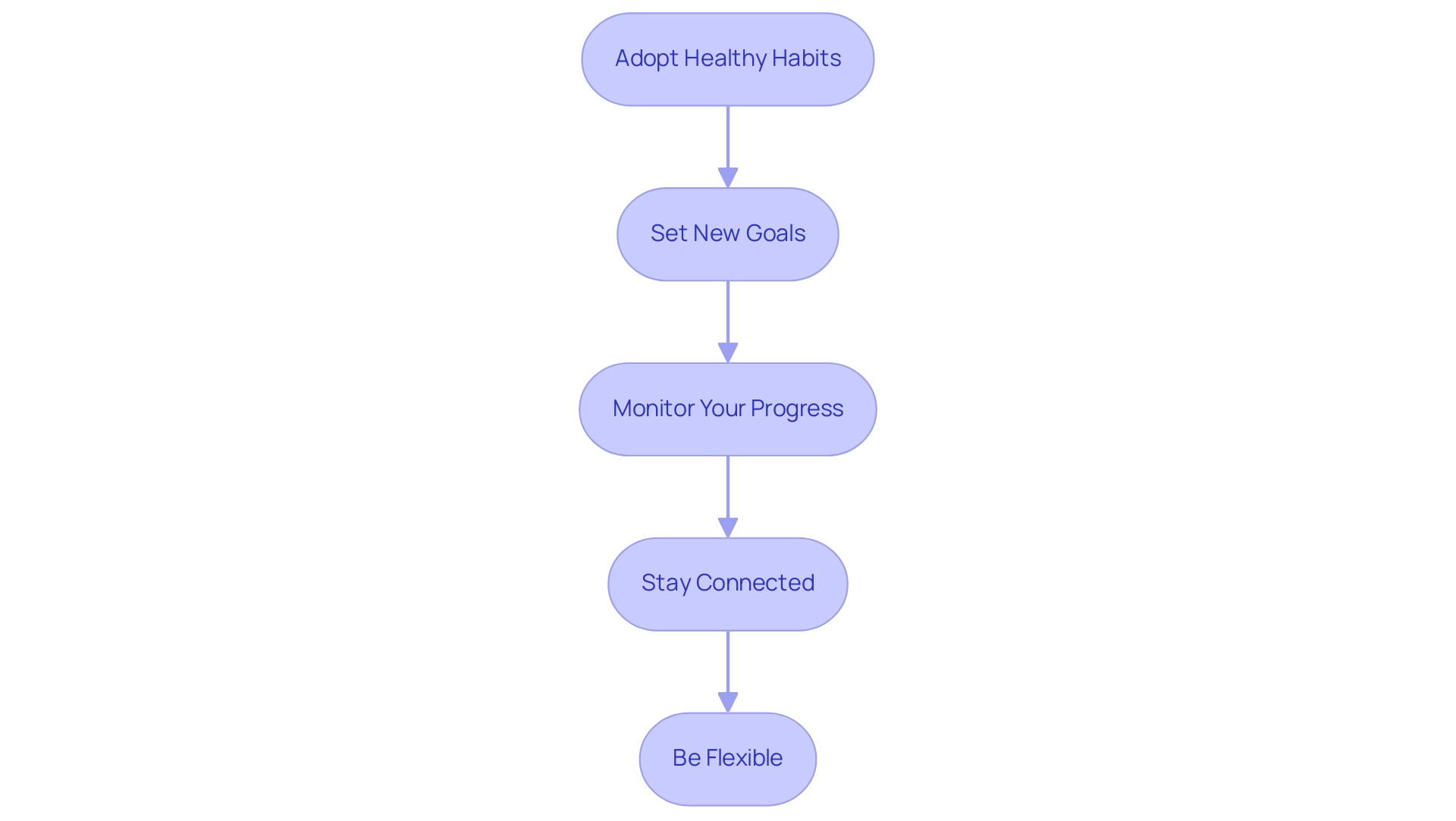
Conclusion
The 6-week diet framework offers a structured approach to weight loss that combines detoxification, calorie management, and sustainable habits. By following its three distinct phases, individuals can reset their metabolism, learn to manage their caloric intake, and ultimately establish healthy routines that support long-term success. The integration of expert coaching and personalized support further enhances the effectiveness of this program, ensuring that participants remain motivated and focused on their goals.
In addition to dietary adjustments, incorporating exercise into the weight loss journey is crucial. Engaging in enjoyable physical activities not only boosts metabolism but also contributes to overall well-being. By setting realistic goals and making small lifestyle changes, individuals can seamlessly integrate exercise into their daily routines, thereby enhancing their weight loss efforts.
Addressing common challenges such as:
- Plateaus
- Cravings
- Social situations
is essential for maintaining progress. By employing effective strategies and staying committed, individuals can overcome these obstacles and continue on their path to success. Ultimately, the journey does not end with reaching a weight loss goal; sustaining that achievement through healthy habits, ongoing support, and flexibility is vital for long-term success. Embracing this comprehensive framework empowers individuals to cultivate a balanced lifestyle that lasts well beyond the initial weight loss phase.
Frequently Asked Questions
What is the structure of the 6-week diet plan to lose 20 pounds?
The diet plan is organized into three distinct phases: detoxification, calorie reduction, and maintenance.
What is the focus of the initial phase of the diet plan?
The initial phase focuses on detoxifying the body, eliminating toxins, and resetting metabolism, with participants encouraged to adopt a no-sugar diet.
What dietary changes are recommended during the second phase?
The second phase emphasizes calorie reduction while maintaining nutritional balance through a variety of safe, nutrient-dense foods without added salt or sugars.
How can individuals calculate their caloric needs during the calorie reduction phase?
Caloric needs can be calculated using the Mifflin-St Jeor equation: 10 x mass in kg + 6.25 x height in cm – 5 x age in years – 161.
What is the goal of the final phase of the diet plan?
The final phase aims to maintain a healthy body composition through sustainable habits, including continued meal planning and tracking progress.
How does Foresight Health Coaching support individuals on this diet plan?
Foresight Health Coaching offers tailored coaching services, personalized nutritional guidance, wellness workshops, and corporate memberships that include pantry and nutrition services.
What are some key strategies for successful weight loss as part of this diet plan?
Key strategies include prioritizing whole foods, controlling portion sizes, staying hydrated, planning meals ahead, and incorporating healthy fats.
Why is it important to prioritize whole foods in the diet plan?
Prioritizing whole foods helps reduce processed items and supports effective weight loss, as evidenced by research indicating significant reductions in BMI and cholesterol levels.
How can portion sizes be managed effectively?
Using smaller plates and bowls can help manage portion sizes and reduce overall calorie intake.
What role does hydration play in the diet plan?
Staying hydrated helps control hunger and enhances metabolic processes, making it a foundational aspect of the weight loss plan.

